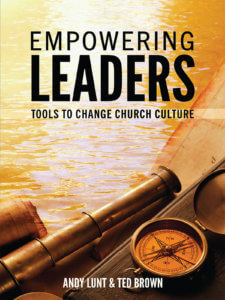Are your church members kept busy doing committee work they are neither gifted for nor excited about? Andy Lunt and Ted Brown say congregations can free people to serve more fruitfully in ministry by reassessing the role of any committee not essential to their mission or required by their polity.
Church committees can be the black hole of ministry. Good ideas from passionate people are sent there and, more often than not, never heard from again. By the time a committee considers an idea for ministry and consults with others or refers it to a board for approval, the opportunity may have passed or the individuals with the idea may have lost interest.
There are two basic disadvantages of committees in the church: 1) They consume enormous amounts of time and energy from people who then have little of either left to actually do ministry; and 2) They give a false impression that serving on a committee represents real ministry. A Sunday School team could spend too much time selecting the “perfect” curriculum and too little time coaching and enabling Sunday School teachers.
The majority of people serving on committees in our churches are there because they couldn’t say no. When a member of the congregation’s nominating committee, or in some cases the pastor, called to say, “we really need you on this committee,” they were afraid they would feel guilty if they declined. But guilt is not a very good motivator for service. The end result is that we get committees populated by people who don’t really want to be there. Except for a few people whose gifts are administration and organization, serving on a committee is not a ministry for which most folks are gifted and called.
But there is a second, even greater disadvantage. Well-intentioned committee members spend hours and hours over a period of months coming up with plans for a significant program or event. Then, they have to find someone to actually do the work of making it happen. But no one is left because too many members have been expending all their available time and energy serving on committees. If a majority of committed members in any church devote their time to serving on committees, very few people actually get to do hands-on ministry. It could be said, we think, that there is an inverse ratio between the number of people serving on committees and the amount of ministry in the world that gets done.
Some committees are needed.
Now let’s be honest. Churches do need a few committees. Clearly, some structure is needed to provide overall vision and direction. Every congregation will need a church council or board. Budgets and funding plans must be approved, progress toward goals that implement the purpose should be evaluated, and staff must be hired and deployed. In addition to the council/board, a finance committee is likely needed to oversee the development and month-to-month performance of the budget and funding. A pastor parish or staff parish committee will handle staffing and accountability for the paid staff. Recruitment and deployment of those who are unpaid would fall to a nominating or leadership development committee. These administrative committees may be sufficient for many congregations.
The advantages of task groups or ministry teams
Some churches may want to have committees for things like worship, Christian learning, or mission. But it will usually be much better to simply entrust these functions to task groups or ministry teams who are actually involved in these areas. At Glen Mar UMC, for example, there were worship teams for each of the four distinct worship services. For the most part, they spoke different languages and had different priorities suited to the individual service in which they participated. Asking one overall group to take responsibility for services that ran the gamut from informal to traditional to cutting edge contemporary would have been to invite disaster. With a narrower focus, ministry teams can meet, plan, and evaluate more effectively.
Freeing people from committees is only a first step.
So, … what can we do to change this? Well, first, it’s not as simple as just getting rid of all committees. That step is essential, but not sufficient. Folks who have been consumers of ministry or servers on committees are not going to suddenly become active ministers. They need help, guidance, and ongoing support. The first resource in helping individuals and congregations through this transition is the Bible. Yes, we need to go back to basics. Nothing can substitute for disciplined group Bible study as a means of helping individuals grow to a more mature understanding of the nature of the church and their role in doing ministry.
It is also essential to help each individual — including the pastor — discover their unique gifts for ministry. Each congregation can choose the method that fits their context best. The important thing is to find and use a good spiritual gifts inventory and then provide the follow-up training and support that will enable individuals to do what God has called them and equipped them to do as ministers.
It is important for churches to evaluate all their standing practices in light of their purpose and then be willing to abandon or change those that no longer serve to advance the mission. This can begin by reassessing how many committees are essential to your mission or required by your particular polity. Rather than one group planning and then having to find others to implement, there is effectiveness and excitement when the people with passion to do something are the ones who plan, implement, and then evaluate whether it is worth doing again. This is a much better use of time and energy. People end up doing what they want to do and are passionate about doing, rather than something they were asked to do and couldn’t say no.
 Excerpted from Empowering Leaders: Tools to Change Church Culture (Lucid Books, 2023) by Andy Lunt and Ted Brown. Used by permission. The book is available at Cokesbury and Amazon.
Excerpted from Empowering Leaders: Tools to Change Church Culture (Lucid Books, 2023) by Andy Lunt and Ted Brown. Used by permission. The book is available at Cokesbury and Amazon.
- 50 Ways to Increase Active Engagement, a free tip sheet from the Lewis Center
- Freeing Laity for Ministry by Laura Heikes
- Why Don’t People Volunteer at Church? by Mike Schreiner and Ken Willard
Cover image by redgreystock on Freepik






